Deck 5: Trigonometric Functions
سؤال
سؤال
سؤال
سؤال
سؤال
سؤال
سؤال
سؤال
سؤال
سؤال
سؤال
سؤال
سؤال
سؤال
سؤال
سؤال
سؤال
سؤال
سؤال
سؤال
سؤال
سؤال
سؤال
سؤال
سؤال

فتح الحزمة
قم بالتسجيل لفتح البطاقات في هذه المجموعة!
Unlock Deck
Unlock Deck
1/25
العب
ملء الشاشة (f)
Deck 5: Trigonometric Functions
1
Find an equation using the cotangent function that has the same graph as  .
.
A)
B)
C)
D)
E)
 .
.A)

B)

C)

D)

E)

C
2
The phases of the moon can be described using the phase angle  , determined by the sun, the moon, and the Earth, as shown in the figure. Because the moon orbits Earth,
, determined by the sun, the moon, and the Earth, as shown in the figure. Because the moon orbits Earth,  changes during the course of a month. The area of the region A of the moon, which appears illuminated to an observer on Earth, is given by
changes during the course of a month. The area of the region A of the moon, which appears illuminated to an observer on Earth, is given by  , where R = 1,080 mi is the radius of the moon. Approximate A for the following position of the moon:
, where R = 1,080 mi is the radius of the moon. Approximate A for the following position of the moon: 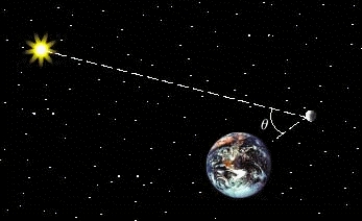

A) A = 8,094,766 mi 2
B) A = 3,654,317 mi 2
C) A = 586,254 mi 2
D) A = 3,175,511 mi 2
E) A = 2,023,691 mi 2
 , determined by the sun, the moon, and the Earth, as shown in the figure. Because the moon orbits Earth,
, determined by the sun, the moon, and the Earth, as shown in the figure. Because the moon orbits Earth,  changes during the course of a month. The area of the region A of the moon, which appears illuminated to an observer on Earth, is given by
changes during the course of a month. The area of the region A of the moon, which appears illuminated to an observer on Earth, is given by  , where R = 1,080 mi is the radius of the moon. Approximate A for the following position of the moon:
, where R = 1,080 mi is the radius of the moon. Approximate A for the following position of the moon: 

A) A = 8,094,766 mi 2
B) A = 3,654,317 mi 2
C) A = 586,254 mi 2
D) A = 3,175,511 mi 2
E) A = 2,023,691 mi 2
E
3
On March 17, 1981, in Tucson, Arizona, the temperature in degrees Fahrenheit could be described by the equation  while the relative humidity in percent could be expressed by
while the relative humidity in percent could be expressed by  where t is in hours and t = 0 corresponds to 6 AM. Find the maximum value of the humidity.
where t is in hours and t = 0 corresponds to 6 AM. Find the maximum value of the humidity.
A) H = 10%
B) H = 90%
C) H = 35%
D) H = 55%
E) H = 85%
 while the relative humidity in percent could be expressed by
while the relative humidity in percent could be expressed by  where t is in hours and t = 0 corresponds to 6 AM. Find the maximum value of the humidity.
where t is in hours and t = 0 corresponds to 6 AM. Find the maximum value of the humidity.A) H = 10%
B) H = 90%
C) H = 35%
D) H = 55%
E) H = 85%
E
4
Scientists sometimes use the formula  to simulate temperature variations during the day, with time t in hours, temperature f ( t ) in
to simulate temperature variations during the day, with time t in hours, temperature f ( t ) in  , and t=0 corresponding to midnight. Assume that f ( t ) is decreasing at midnight. Determine values of a, b, c, and d that fit the information: the high temperature is 19
, and t=0 corresponding to midnight. Assume that f ( t ) is decreasing at midnight. Determine values of a, b, c, and d that fit the information: the high temperature is 19  , and the low temperature of -19
, and the low temperature of -19  occurs at 4 A.M.
occurs at 4 A.M.
A)
B)
C)
D)
E)
 to simulate temperature variations during the day, with time t in hours, temperature f ( t ) in
to simulate temperature variations during the day, with time t in hours, temperature f ( t ) in  , and t=0 corresponding to midnight. Assume that f ( t ) is decreasing at midnight. Determine values of a, b, c, and d that fit the information: the high temperature is 19
, and t=0 corresponding to midnight. Assume that f ( t ) is decreasing at midnight. Determine values of a, b, c, and d that fit the information: the high temperature is 19  , and the low temperature of -19
, and the low temperature of -19  occurs at 4 A.M.
occurs at 4 A.M.A)

B)

C)

D)

E)


فتح الحزمة
افتح القفل للوصول البطاقات البالغ عددها 25 في هذه المجموعة.
فتح الحزمة
k this deck
5
Find y by referring to the graph of the trigonometric function.
A)
B)
C)
D)
E) 1
A)
B)
C)
D)
E) 1

فتح الحزمة
افتح القفل للوصول البطاقات البالغ عددها 25 في هذه المجموعة.
فتح الحزمة
k this deck
6
Sketch the graph of the equation. 
A)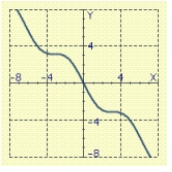
B)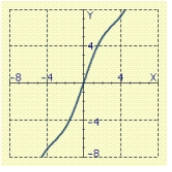
C)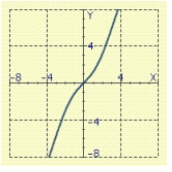
D)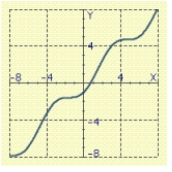
E)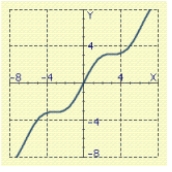

A)

B)

C)

D)

E)


فتح الحزمة
افتح القفل للوصول البطاقات البالغ عددها 25 في هذه المجموعة.
فتح الحزمة
k this deck
7
Find the exact value. 
A)
B)
C)
D)
E)

A)

B)

C)

D)

E)


فتح الحزمة
افتح القفل للوصول البطاقات البالغ عددها 25 في هذه المجموعة.
فتح الحزمة
k this deck
8
Find the period of the equation. 
A)
B)
C)
D)
E)

A)

B)

C)

D)

E)


فتح الحزمة
افتح القفل للوصول البطاقات البالغ عددها 25 في هذه المجموعة.
فتح الحزمة
k this deck
9
Express the angle as a decimal, to the nearest ten-thousandth of a degree. 
A)
B)
C)
D)
E)

A)

B)

C)

D)

E)


فتح الحزمة
افتح القفل للوصول البطاقات البالغ عددها 25 في هذه المجموعة.
فتح الحزمة
k this deck
10
Rewrite the expression in nonradical form without using absolute values for the indicated values of  .
.  ;
; 
A)
B)
C)
D)
E)
 .
.  ;
; 
A)

B)

C)

D)

E)


فتح الحزمة
افتح القفل للوصول البطاقات البالغ عددها 25 في هذه المجموعة.
فتح الحزمة
k this deck
11
Let P ( t ) be the point on the unit circle U that corresponds to t. If P ( t ) has the coordinates  , find
, find  ,
,  ,
,  ,
,  .
.
A)

B)

C)

D)

E)

 , find
, find  ,
,  ,
,  ,
,  .
.A)


B)


C)


D)


E)



فتح الحزمة
افتح القفل للوصول البطاقات البالغ عددها 25 في هذه المجموعة.
فتح الحزمة
k this deck
12
A forester, 210 feet from the base of a redwood tree, observes that the angle between the ground and the top of the tree is  . Estimate the height of the tree.
. Estimate the height of the tree.
A) 493.1 feet
B) 37.0 feet
C) 440.9 feet
D) 422.0 feet
E) 430.6 feet
 . Estimate the height of the tree.
. Estimate the height of the tree.A) 493.1 feet
B) 37.0 feet
C) 440.9 feet
D) 422.0 feet
E) 430.6 feet

فتح الحزمة
افتح القفل للوصول البطاقات البالغ عددها 25 في هذه المجموعة.
فتح الحزمة
k this deck
13
Find the exact value. 
A)
B)
C)
D)
E)

A)

B)

C)

D)

E)


فتح الحزمة
افتح القفل للوصول البطاقات البالغ عددها 25 في هذه المجموعة.
فتح الحزمة
k this deck
14
Estimate the horizontal asymptote. 
A)
B)
C)
D)
E)

A)

B)

C)

D)

E)


فتح الحزمة
افتح القفل للوصول البطاقات البالغ عددها 25 في هذه المجموعة.
فتح الحزمة
k this deck
15
Points on the terminal sides of angles play an important part in the design of arms for robots. Suppose a robot has a straight arm 20 inches long that can rotate about the origin in a coordinate plane. If the robot's hand is located at (20, 0) and then rotates through an angle of 60 o , what is the new location of the hand?
A)
B)
C)
D)
E)
A)

B)

C)

D)

E)


فتح الحزمة
افتح القفل للوصول البطاقات البالغ عددها 25 في هذه المجموعة.
فتح الحزمة
k this deck
16
Find the exact values of the six trigonometric functions of the angle, whenever possible. 
A)
B)
C)
D)
E)

A)

B)

C)

D)

E)


فتح الحزمة
افتح القفل للوصول البطاقات البالغ عددها 25 في هذه المجموعة.
فتح الحزمة
k this deck
17
The thickness of the ozone layer can be estimated using the formula  where I 0 is the intensity of a particular wavelength of light from the sun before it reaches the atmosphere, I is the intensity of the same wavelength after passing through a layer of ozone x centimeters thick, k is the absorption constant of ozone for that wavelength, and
where I 0 is the intensity of a particular wavelength of light from the sun before it reaches the atmosphere, I is the intensity of the same wavelength after passing through a layer of ozone x centimeters thick, k is the absorption constant of ozone for that wavelength, and  is the acute angle that the sunlight makes with the vertical. Suppose that for a wavelength of 3,055
is the acute angle that the sunlight makes with the vertical. Suppose that for a wavelength of 3,055  10 - 8 centimeter with k
10 - 8 centimeter with k  1.93, I o /I is measured as 1.72 and
1.93, I o /I is measured as 1.72 and  . Approximate the thickness of the ozone layer to the nearest 0.01 centimeter.
. Approximate the thickness of the ozone layer to the nearest 0.01 centimeter.
A) cm
cm
B) cm
cm
C) cm
cm
D) cm
cm
E) cm
cm
 where I 0 is the intensity of a particular wavelength of light from the sun before it reaches the atmosphere, I is the intensity of the same wavelength after passing through a layer of ozone x centimeters thick, k is the absorption constant of ozone for that wavelength, and
where I 0 is the intensity of a particular wavelength of light from the sun before it reaches the atmosphere, I is the intensity of the same wavelength after passing through a layer of ozone x centimeters thick, k is the absorption constant of ozone for that wavelength, and  is the acute angle that the sunlight makes with the vertical. Suppose that for a wavelength of 3,055
is the acute angle that the sunlight makes with the vertical. Suppose that for a wavelength of 3,055  10 - 8 centimeter with k
10 - 8 centimeter with k  1.93, I o /I is measured as 1.72 and
1.93, I o /I is measured as 1.72 and  . Approximate the thickness of the ozone layer to the nearest 0.01 centimeter.
. Approximate the thickness of the ozone layer to the nearest 0.01 centimeter.A)
 cm
cmB)
 cm
cmC)
 cm
cmD)
 cm
cmE)
 cm
cm
فتح الحزمة
افتح القفل للوصول البطاقات البالغ عددها 25 في هذه المجموعة.
فتح الحزمة
k this deck
18
Use fundamental identities to find the exact values of the trigonometric functions for the given conditions. 
A)
B)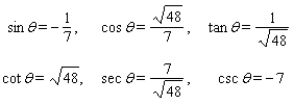
C)
D)
E)

A)

B)

C)

D)

E)


فتح الحزمة
افتح القفل للوصول البطاقات البالغ عددها 25 في هذه المجموعة.
فتح الحزمة
k this deck
19
Find the exact value. 
A)
B)
C)
D)
E)

A)

B)

C)

D)

E)


فتح الحزمة
افتح القفل للوصول البطاقات البالغ عددها 25 في هذه المجموعة.
فتح الحزمة
k this deck
20
The graph of an equation of a sine wave is shown in the figure. Find the amplitude, period, and phase shift. 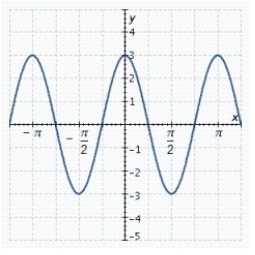
A) ,
, 
B) ,
, 
C) ,
, 
D) ,
, 
E) ,
, 

A)
 ,
, 
B)
 ,
, 
C)
 ,
, 
D)
 ,
, 
E)
 ,
, 

فتح الحزمة
افتح القفل للوصول البطاقات البالغ عددها 25 في هذه المجموعة.
فتح الحزمة
k this deck
21
An airplane flying at a speed of 300 mi/hr flies from a point A in the direction  for 15 minutes and then flies in the direction
for 15 minutes and then flies in the direction  for 45 minutes. Approximate, to the nearest mile, the distance from the airplane to A.
for 45 minutes. Approximate, to the nearest mile, the distance from the airplane to A.
A) 474 mi
B) 237 mi
C) 213 mi
D) 134 mi
E) 300 mi
 for 15 minutes and then flies in the direction
for 15 minutes and then flies in the direction  for 45 minutes. Approximate, to the nearest mile, the distance from the airplane to A.
for 45 minutes. Approximate, to the nearest mile, the distance from the airplane to A.A) 474 mi
B) 237 mi
C) 213 mi
D) 134 mi
E) 300 mi

فتح الحزمة
افتح القفل للوصول البطاقات البالغ عددها 25 في هذه المجموعة.
فتح الحزمة
k this deck
22
A ladder 24 feet long leans against the side of a building, and the angle between the ladder and the building is  . a) Approximate the distance from the bottom of the ladder to the building. Give the answer to one decimal place.
. a) Approximate the distance from the bottom of the ladder to the building. Give the answer to one decimal place.
B) If the distance from the bottom of the ladder to the building is increased by 2 feet, approximately how far does the top of the ladder move down the building? Give the answer to one decimal place.
A) distance from the bottom of the ladder to the building
Ladder movement
B) distance from the bottom of the ladder to the building
Ladder movement
C) distance from the bottom of the ladder to the building
Ladder movement
D) distance from the bottom of the ladder to the building
Ladder movement
E) distance from the bottom of the ladder to the building
Ladder movement
 . a) Approximate the distance from the bottom of the ladder to the building. Give the answer to one decimal place.
. a) Approximate the distance from the bottom of the ladder to the building. Give the answer to one decimal place.B) If the distance from the bottom of the ladder to the building is increased by 2 feet, approximately how far does the top of the ladder move down the building? Give the answer to one decimal place.
A) distance from the bottom of the ladder to the building

Ladder movement

B) distance from the bottom of the ladder to the building

Ladder movement

C) distance from the bottom of the ladder to the building

Ladder movement

D) distance from the bottom of the ladder to the building

Ladder movement

E) distance from the bottom of the ladder to the building

Ladder movement


فتح الحزمة
افتح القفل للوصول البطاقات البالغ عددها 25 في هذه المجموعة.
فتح الحزمة
k this deck
23
A builder wishes to construct a ramp 23 feet long that rises to a height of 4.5 feet above level ground. Approximate the angle that the ramp should make with the horizontal. Round the answer to the nearest degree.
A)
B)
C)
D)
E)
A)

B)

C)

D)

E)


فتح الحزمة
افتح القفل للوصول البطاقات البالغ عددها 25 في هذه المجموعة.
فتح الحزمة
k this deck
24
A rocket is fired at sea level and climbs at a constant angle of  through a distance of 10,500 feet. Approximate its altitude to the nearest foot.
through a distance of 10,500 feet. Approximate its altitude to the nearest foot.
A) 85,516 ft
B) 85,510 ft
C) 1,280 ft
D) 1,271 ft
E) 10,422 ft
 through a distance of 10,500 feet. Approximate its altitude to the nearest foot.
through a distance of 10,500 feet. Approximate its altitude to the nearest foot.A) 85,516 ft
B) 85,510 ft
C) 1,280 ft
D) 1,271 ft
E) 10,422 ft

فتح الحزمة
افتح القفل للوصول البطاقات البالغ عددها 25 في هذه المجموعة.
فتح الحزمة
k this deck
25
A CB antenna is located on the top of a garage that is 17 feet tall. From a point on level ground that is 120 feet from a point directly below the antenna, the antenna subtends an angle of  , as shown in the figure. Approximate the length of the antenna. Give the answer to one decimal place.
, as shown in the figure. Approximate the length of the antenna. Give the answer to one decimal place. 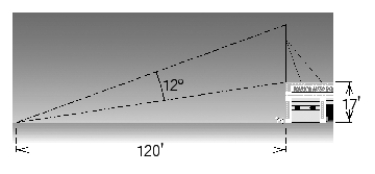
A) 345.6 ft
B) 36.8 ft
C) 95.7 ft
D) 24.2 ft
E) 26.8 ft
 , as shown in the figure. Approximate the length of the antenna. Give the answer to one decimal place.
, as shown in the figure. Approximate the length of the antenna. Give the answer to one decimal place. 
A) 345.6 ft
B) 36.8 ft
C) 95.7 ft
D) 24.2 ft
E) 26.8 ft

فتح الحزمة
افتح القفل للوصول البطاقات البالغ عددها 25 في هذه المجموعة.
فتح الحزمة
k this deck








